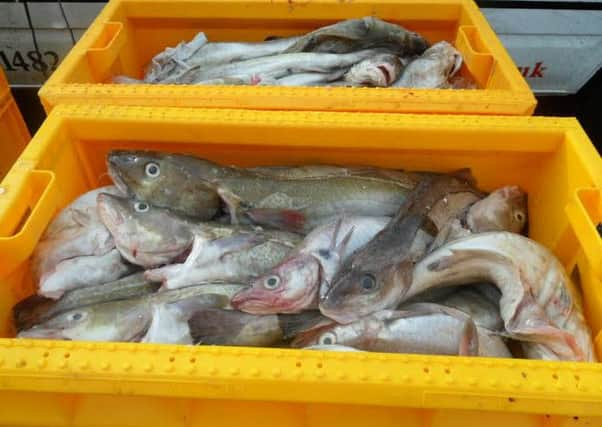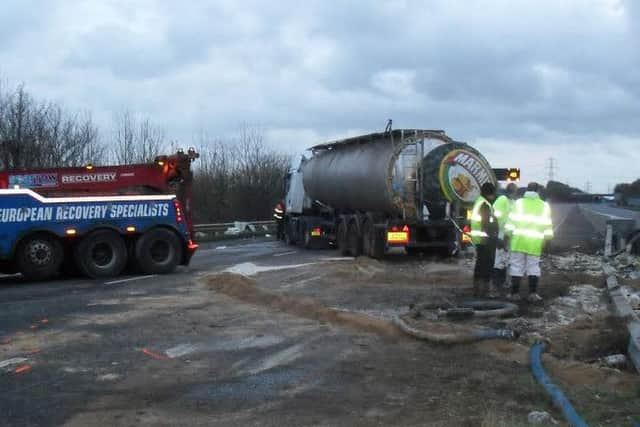Salmon, Marmite and 6,000 chickens - Top 10 strangest motorway spills


And drivers in our region have faced some of the most unusual in the country - caused by motorway spillages.
A spill of 20 tonnes of Marmite on the M1 in South Yorkshire and a pile of 10 tonnes of salmon on the M62 in Humberside have been featured in a list of the top ten strangest spillages on England’s motorways.
Advertisement
Hide AdAdvertisement
Hide AdHighways England created the list to help drivers understand the challenges it faces to clear up after unexpected motorway incidents.


Over the past few years, there have been several, from the strange, to the dangerous. But the company picked these ten as the most bizarre.
• Raw human sewage
• 6,000 chickens
• Hundreds of tins of baked beans
• 20 tonnes of Marmite (yeast extract)
• Thousands of lager cans
• 10 tonnes of salmon
• Melamine formaldehyde resin and phosphoric acid
• Animal blood
• Refrigerated liquid oxygen
• Powdered cement
For every spillage, Highways England teams worked quickly to remove the debris, clear the road and fix damage before safely re-opening the carriageway to drivers.
In some cases, they picked up thousands of items by hand after the debris spread across several lanes of the motorway.
Advertisement
Hide AdAdvertisement
Hide AdMelanie Clarke, director of customer operations at Highways England, said: “Our roads are among the safest in the world, and safety is our number one priority.
“Our role is to ensure we clear incidents quickly, and keep traffic moving to minimise delays. We work closely with the emergency services, in challenging circumstances, to try to keep drivers moving after an incident.
“We know drivers get frustrated when their journeys are disrupted but we do all we can to clean the road quickly after an incident – and it’s often much more complicated than simply moving the vehicles off the road to reopen it.
“That’s why it can often take longer for us to safely reopen roads when a potentially dangerous substance is spilled in an incident.
Advertisement
Hide AdAdvertisement
Hide Ad“Our teams expect the unexpected, but of course, when you’re dealing with ten tonnes of salmon, dangerous toxic chemicals, or emulsion paint, the clean-up operation is somewhat complicated.”
It took the teams 12 hours to clean up and fix the damage after yeast extract spread across the M1 between junctions 33 and 32 in November 2011.
The clear-up teams had to remove the sticky black Marmite from the motorway and use sandbags to stop it spreading further.
The vehicle’s driver was freed after becoming trapped in the cab and damage to the central reservation was repaired.
Advertisement
Hide AdAdvertisement
Hide AdIn March 2013, an overturned HGV on the M62 between junctions 34 and 35 spilled ten tonnes of salmon onto the carriageway.
The incident happed in the early hours of morning with highways teams mobilised in the middle of the night to hand pick the fish from the road.
The motorway did not re-open until 6pm that evening after a complicated clean up operation involving tipping the HGV and repairing the central reservation.
Other spills in Yorkshire have included a tonne of loose gravel stones and toxic waste.
Advertisement
Hide AdAdvertisement
Hide AdBut despite having to deal with some unusual shed loads, everyday items pose the biggest challenge for the Highways England clean-up teams.
Diesel creates a chemical reaction which causes the road surface to rot. Teams have to use specialised hydroblasters to completely clean the road and ensure there is no left over fuel, which could create pot holes.
Spilt milk also causes road surfaces to rot and become slippery. It can become especially problematic if it gets into nearby water sources as it deprives the water of oxygen and could affect fish, animals and people.